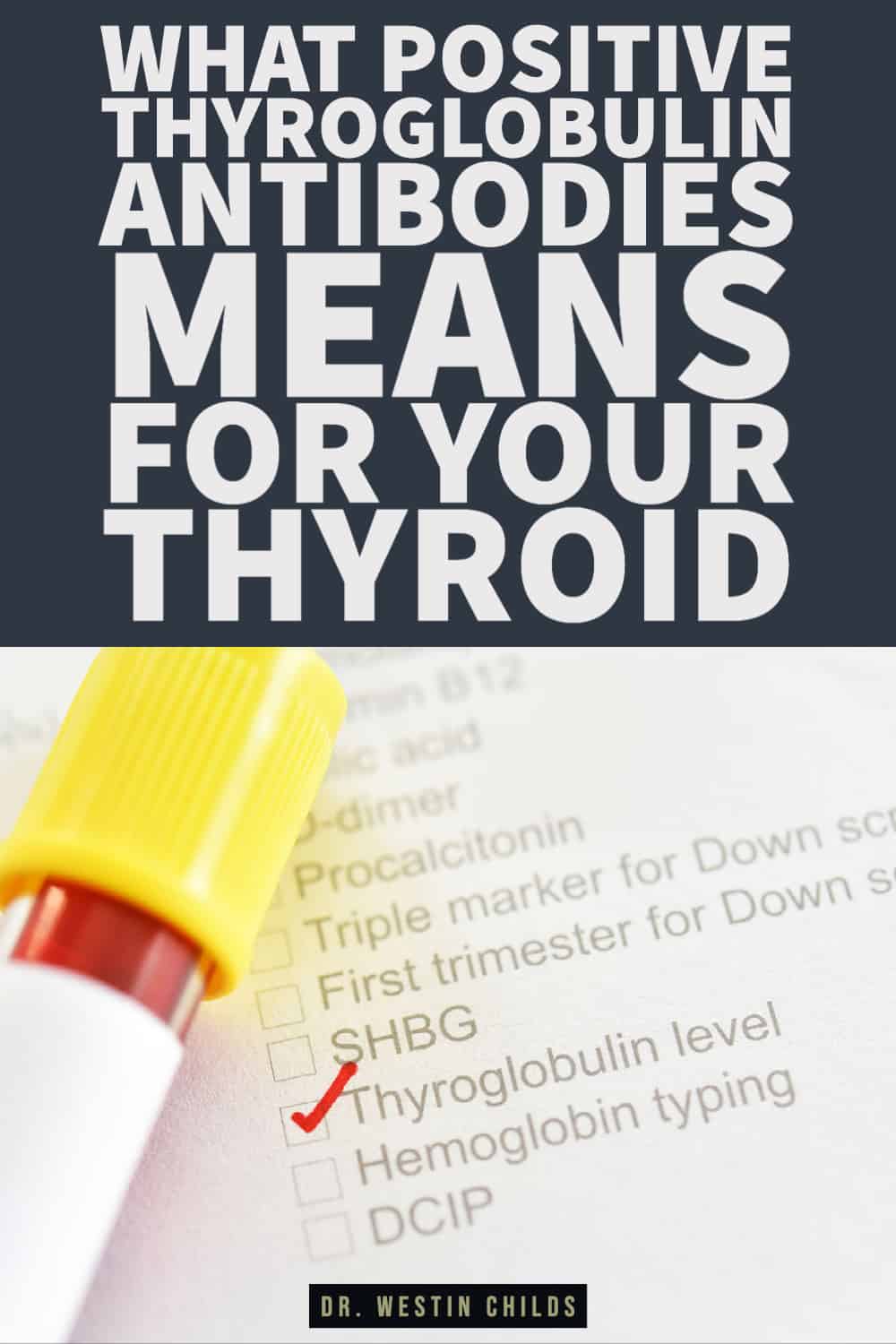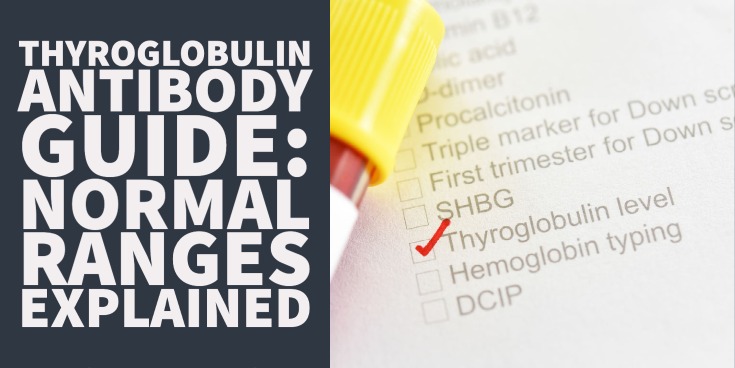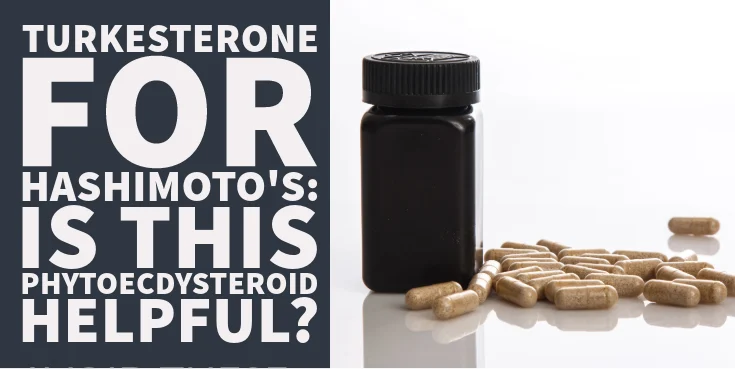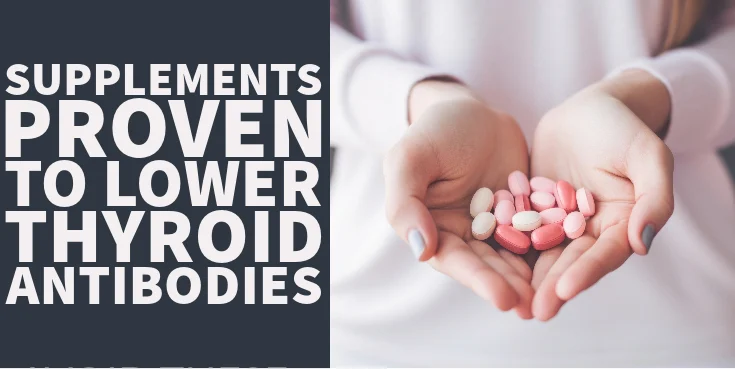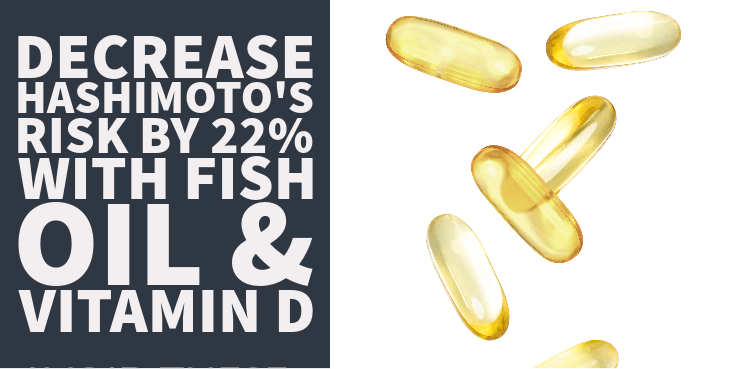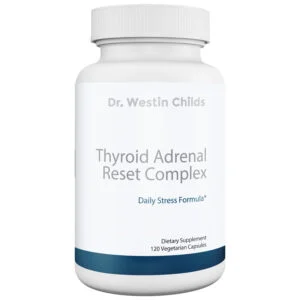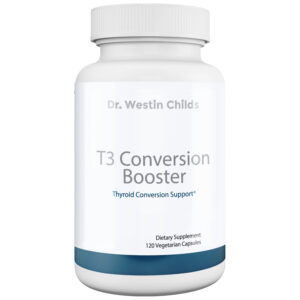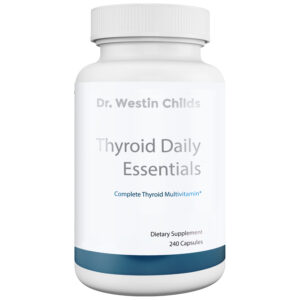What is a Thyroglobulin Antibody? (In plain English)
Let’s make this super easy:
Thyroglobulin is an important protein found directly in your thyroid gland.
This protein plays an important role in helping your body CREATE thyroid hormone, STORE thyroid hormone, and RELEASE (1) thyroid hormone.
Thyroglobulin antibodies are antibodies that your own immune system creates which ATTACK this particular protein.
You can imagine how this would be a problem for your thyroid gland if your own body is attacking it (we will get to that later).
If present, they often indicate both an immune problem AND a thyroid problem which is why they are so important.
They indicate an immune problem because your immune system should not be attempting to destroy your own body and they indicate a thyroid problem because eventually, your own body will destroy your own thyroid gland.
These antibodies float around in your blood and target your thyroid which results in both inflammation and damage over time.
This damage eventually adds up to prevent the release of thyroid hormone which causes hypothyroidism or low thyroid function.
The good news is that you can TEST for these antibodies (again, more on that below) which gives you powerful insight as to what is happening to both your thyroid gland and your immune system.
DOWNLOAD FREE RESOURCES
Foods to Avoid if you Have Thyroid Problems:
I’ve found that these 10 foods cause the most problems for thyroid patients. Learn which foods you should avoid if you have thyroid disease of any type.
The Complete List of Thyroid Lab tests:
The list includes optimal ranges, normal ranges, and the complete list of tests you need to diagnose and manage thyroid disease correctly!
What does it mean if you have these antibodies?
The big question on your mind is this:
What does it mean if I have these antibodies in MY body?!
And the answer is somewhat simple and complex all at the same time.
In almost EVERY case of elevated or high thyroglobulin antibodies, it means that something is wrong with your immune system.
Your body would not normally create antibodies to your own tissue if your immune system was working properly.
That’s the simple part.
The complex part is understanding what that means.
For the MAJORITY of people, the presence of thyroglobulin antibodies means that you have an autoimmune disease of your thyroid gland (most likely Hashimoto’s thyroiditis).
It’s not quite that simple, though, because thyroglobulin antibodies can ALSO be elevated in cases of Graves’ disease (which is another thyroid disease that causes hyperthyroidism instead of hypothyroidism like Hashimoto’s thyroiditis).
To make it even more confusing, there are some people (although a small percentage of the whole) who have elevated thyroglobulin antibodies with a normal thyroid gland/function (2).
High levels of thyroglobulin antibodies can sometimes be seen in other autoimmune conditions such as Vitiligo (3) and other conditions such as cancer and even pregnancy (4).
So you can see why it gets a little bit confusing.
That’s why I think it’s important to stay focused on the fact that everyone with high thyroglobulin antibodies has a problem with their immune system.
How that presents may be different for each of you, meaning you may attack your thyroid gland or not, but what’s important is that you should focus on your immune system.
It’s also important to point out that probably 70-90%+ of people who have thyroglobulin antibodies will have Hashimoto’s thyroiditis or at least some form of autoimmune thyroiditis.
Understanding the connection between your immune system and thyroglobulin antibodies is very important, though, because it influences what you can do about treatment (more on that below).
Thyroglobulin and Hashimoto’s
As mentioned, most people with elevated thyroglobulin antibodies will have a disease known as Hashimoto’s thyroiditis.
Hashimoto’s thyroiditis is an autoimmune disease of your thyroid gland which eventually results in hypothyroidism or low thyroid function.
When most people talk about thyroglobulin they are usually referring to this antibody in the context of Hashimoto’s thyroiditis and that disease state.
I mentioned above that these antibodies don’t always indicate this disease but, nonetheless, they have kind have become synonymous with one another (for better or worse).
No matter how you look at it though, these antibodies are primarily directed at a specific portion of the thyroid gland known as thyroglobulin.
And if left unchecked and untreated, these antibodies will eventually destroy your thyroid gland resulting in permanent hypothyroidism.
Normal vs Abnormal Reference Ranges
The good news here is that it’s actually fairly easy to understand if your thyroglobulin levels are abnormal.
This is in contrast to other thyroid lab tests such as TSH, free T3, free T4, total T3, and reverse T3 which require more nuance in their interpretation of “normal” and “optimal”.
When it comes to your thyroglobulin level you can use this as a basic rule of thumb:
The higher your thyroglobulin level the worse it will be for your body.
You really don’t want your levels to be elevated in any sense of the word.
And, the higher they are, typically that means the worse it is for your immune system.
So how do you measure if your levels are abnormal?
This is one area where looking at the standard reference range is helpful.
The lab test should give you a measure of what is abnormal and that is usually around 4 to 15 (depending on your lab) IU/ml.

Healthy levels should be LOWER than this level and your results will often read something like:
Result: < 4.0 IU/ml.
This result means that your levels were so low that they couldn’t be detected under this threshold.
Results that are higher will read something like this:
Result: 212 IU/ml. Normal range: < 4.0 IU/ml.
This result shows that you have a value of 212 IU/ml when it should be less than 4.0 IU/ml.
Symptoms of Elevated Thyroglobulin Antibodies
You might be tempted to ask yourself what kind of symptoms you should expect if you have these antibodies in your blood.
This is a perfectly fine question to ask but it’s not as straightforward as you might think.
You see, these antibodies don’t necessarily cause problems all by themselves but instead, it’s the damage and inflammation associated with their presence that does.
And this damage isn’t universal in terms of how it makes you feel or how it presents itself.
For instance, you could have these antibodies and experience hypothyroidism or low thyroid function.
In this case, you would experience symptoms such as:
- Weight gain, fatigue, hair loss, cold intolerance, muscle/joint pain, slow heart rate, depression, infertility, and so on.
But these symptoms are not caused because your antibodies are elevated but instead because of their impact on your thyroid gland.
On the flip side, you could have these antibodies and experience hyperthyroidism or high thyroid function.
In this case, you would experience symptoms such as:
- Weight loss, fatigue, dry or brittle hair, heat intolerance, anxiety, palpitations, and tremors.
Again, remember that these symptoms are not a result of the antibodies but a secondary effect of their impact.
Both conditions present with entirely different symptoms (they are exact opposites of one another).
And finally, it’s possible for you to have NO symptoms associated with thyroglobulin antibodies provided the levels are very low or associated with something like the post-partum period.
Bottom line?
Don’t live and die by your symptoms as an indication of the presence or absence of these antibodies.
Thyroglobulin Antibodies vs Thyroid peroxidase antibodies
We’ve spent our time here talking about one of the major antibodies that your body can develop to attack your thyroid gland but it’s not the only one.
Another important antibody is known as anti-TPO antibody or anti-thyroid peroxidase antibody.
Thyroid peroxidase is a protein found inside thyroid cells that helps your body create thyroid hormones.
Thyroglobulin is found in the same place but serves a slightly different function.
Antibodies to both thyroglobulin and thyroid peroxidase can impair thyroid hormone production and function in slightly different ways.
So both antibodies are important when testing for the autoimmune disease known as Hashimoto’s thyroiditis.
But you should be aware that not everyone who has elevated thyroglobulin antibodies will necessarily have elevated TPO antibodies and vice versa.
It’s possible for you to have only ONE set of antibodies present and elevated and the other to be completely normal.
In fact, statistically speaking, it’s more common for TPO antibodies to be elevated and present than it is for thyroglobulin antibodies to be elevated by themselves.
It doesn’t necessarily mean anything, though, as BOTH antibodies have been associated with autoimmune thyroiditis (Hashimoto’s thyroiditis) and you should aggressively try to treat and manage either or both if they are elevated.
What’s interesting is that each of these antibodies targets different portions of the thyroid and, therefore, thyroid function.
It would logically make sense that elevations in one antibody over the other may affect the thyroid differently but we aren’t sure if that’s the case (at least not definitively).
What is certain is that both antibodies NEGATIVELY affect thyroid function and can lead to low thyroid or hypothyroidism if left unchecked.
You should also know that if you are going to test one antibody you should ALWAYS test for the other.
This is usually done automatically by your doctor but just in case they don’t, make sure that you request them both.
Can you Lower your thyroglobulin antibody levels?
The answer here is a definite yes!
But you have to understand the mindset that most doctors have when it comes to your antibody levels.
They don’t really care what your antibodies are because they only care about your thyroid function.
Because of this, it’s up to YOU to understand the types of therapies that can help reduce your levels.
And it will probably be up to you to request frequent retesting of your antibody levels (believe it or not).
You can and should track your thyroglobulin antibody levels periodically to see if whatever therapies you are doing are helping.
If they are helping then you should see your result decreasing.
So, for instance, if your initial result with 212 IU/ml but then you institute various changes including improving your diet, exercising more, improving your sleep, taking certain supplements, using LDN, and so on, you should see your level drop (hopefully) over the next few months.
Rechecking your thyroglobulin level in a few months may look something like this:
Result: 112 IU/ml.
It’s possible to see even more dramatic drops in your thyroglobulin levels provided you are doing the right therapies!
I’ve listed a handful of therapies above and they all may potentially help reduce your antibody levels and, therefore, improve thyroid function.
By the way, the same therapies which help to reduce TPO antibodies ALSO help to reduce thyroglobulin antibodies (and you can read about my favorite therapies here).
Final Thoughts
Thyroglobulin antibodies are an important sign that you have something wrong with your immune system and, most likely, your thyroid gland.
If you have known or suspected thyroid disease of any type then you SHOULD have these antibodies tested for!
While you are at it, be sure to also check for TPO antibodies as well, as problems with one go hand in hand with the other.
What they mean for your body will differ from individual to individual, however, so you can’t make blanket statements about your thyroid gland without further testing of thyroid function.
To do that you will need to look at additional tests such as TSH, free T3, free T4, and reverse T3.
But now I want to hear from you:
Do you have elevated thyroglobulin antibody levels?
If so, how high are they?
Do you ALSO have thyroid problems? Hashimoto’s or Graves’?
Or do you have completely normal thyroid function?
Leave your comments or questions below and share your experience!
